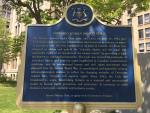This post was originally published on this site
Fifty Chosen Articles:
Number Thirty-Four.
Originally posted in February 2017.
This website – AA Agnostica – was launched when two secular AA groups were booted out of the Greater Toronto Area Intergroup.
It took years for the groups to be allowed back in. That’s when this article was written.
By Roger C.
It’s over.
After a scorching battle that lasted almost six years, agnostic groups will once again be listed on the Greater Toronto Area AA meeting list and be recognized as full, participating members of the GTA Intergroup. And we can interpret and share our own non-godly versions of the Steps, if and as we wish.
As it was put by an Intergroup representative (Mark C from the Welcome Group) at its meeting on Tuesday, January 31: “There is no policing in AA”.
(Ironic, because four self-appointed AA cops showed up at a Widening Our Gateway meeting on a Sunday in late November 2011 and, sure enough, they concluded that there was evidence of “tampered steps”. The group was subsequently booted out of the GTA Intergroup.)
Intergroup had no choice but to yield, really.
As announced in its Quarterly Report (October 2016), the AA General Service Office was planning to cut off its ties with the Greater Toronto Area Intergroup (GTAI):
A motion was made that A.A.W.S, Inc. remove all database directory listings of the Greater Toronto Area Intergroup based on their response to the Ontario Human Rights Tribunal that they are a religious organization. The motion was adopted unanimously by the A.A.W.S. board.
Let me explain.

Click on the image to read about the Human Rights Code “which continues to make Ontario a more just, equitable and inclusive society”.
Larry K, a member of the We Agnostics group, one of the two agnostic groups booted out by the GTAI way back in May 2011, launched a complaint against Intergroup with the Ontario Human Rights Tribunal on September 18, 2014. He claimed that he and the groups, which had their own secular versions of the 12 Steps, were being discriminated against based on religious creed.
The Tribunal indeed views that as a form of discrimination, as stated in its Code:
Every person has the right to be free from discriminatory or harassing behaviour that is based on religion or which arises because the person who is the target of the behaviour does not share the same faith. This principle extends to situations where the person who is the target of such behaviour has no religious beliefs whatsoever, including atheists and agnostics who may, in these circumstances, benefit from the protection set out in the Code.
Two hearings were held (October 22, 2015 and January 13, 2016) and the position of the GTAI was as follows, as reported by the the Tribunal:
The respondent, GTAI, submits that the Alcoholics Anonymous (AA) recovery program follows 12 steps and that these steps involve a belief in God. GTAI submits that evidence indicates that its purpose is to practice the 12 steps and practice a belief in God. In order to be part of GTAI, a group must be prepared to practice the 12 steps and thus the members of the group must have a belief in God… GTAI also submits that it is a bona fide requirement that groups that wish to be part of this intergroup must have a belief in the higher power of God.
You see, the only time you can legitimately ban non-believers, according to the Human Rights Code is if, well, you are a religious organization. That is permitted by Section 18 of the Code where an organization identifies itself as a “special interest organization”. In this case, a religious organization.
Well, you can imagine where this is going.
The GSO’s decision to “de-list” the Greater Intergroup came just before two mediation sessions between Larry and the GTAI, held on November 18, 2016 and January 18, 2017. The Tribunal asks every person who files a human rights application (the Applicant) and every person or organization responding to a human rights application (the Respondent(s)) to participate in mediation in order to attempt to reach a settlement, that is, to resolve the issues raised in the application without going to a formal hearing.

And that’s where the GTAI yielded to the GSO. And yielded to agnostics in AA. In the settlement document, the Greater Toronto Area Intergroup does a complete about-face and acknowledges that a group can be recognized as a participating group in the GTA Intergroup “regardless of the specific beliefs or practices of the group members or the group as a whole”.
The GTAI released a report at its monthly meeting on January 31, 2017, a meeting I attended.
While the GTAI maintains that an AA group needs to “acknowledge” or “adopt” the 12 Steps, 12 Traditions and 12 Concepts of AA, acknowledgement is not a problem. It is simply history. The reading of the secular 12 Steps at Beyond Belief has always been preceded with the statement, “This version is adapted from the original 12 Steps which were first published in 1939 in Chapter 5 of Alcoholic Anonymous.”
Nothing has changed or will. That’s just history.
In a full concession to we agnostics in AA, and our rights within the fellowship, the report goes on to state:
GTA Intergroup acknowledges that the manner in which individual AA members or groups of AA members interpret and apply the Steps and Traditions in their own lives is a matter for those individuals alone.
Those words are the very essence of what the GTAI had to do to achieve a Human Rights Tribunal settlement.
Still, the GTAI fails to understand its own failings and the damage it has done to alcoholics and to the fellowship. One of the paragraphs in its report is particularly bizarre: “It has been, and remains, the GTAI’s position that there has been no discrimination against the complainant, or indeed anyone else, let alone on the prohibited ground of creed”.
Get real.
The GTAI booted groups out – Beyond Belief and We Agnostics on May 31, 2011 and Widening Our Gateway on April 24, 2012 – simply because the groups don’t buy the idea that God is the source of their sobriety. That’s not discrimination against the complainant? Or anyone else? That’s not discrimination based upon the prohibited ground of creed?
What is it then?
The GTAI does however concede that when Larry first went to them to express his concerns, “the response to those concerns was not as constructive as it could have been”.
No, really? I mean, it only took five years. And legal action. And a threat from the GSO.
It makes one wonder whether the GTAI is aware of and/or respects Tradition Three (“The only requirement for AA membership is a desire to stop drinking”).
Ultimately, Intergroup had little choice but to yield to we agnostics in AA.
It had to put aside its religious dogmatism and recognize, if only reluctantly and certainly not wholeheartedly, that the way “individual AA members or groups of AA members interpret and apply the Steps and Traditions in their own lives is a matter for those individuals alone”.
That is AA. Or AA as it was meant to be, before and after the behaviour that the GTAI displayed because a few had the gall to ignore its dogmatic my way or the highway approach to recovery in AA. “All people must necessarily rally to the call of their own particular convictions and we of AA are no exception.” Bill Wilson said that. He was right.
Let us end this article with something that needs to be said, and I am very happy to say it, and share it.
Thank you Larry!
We can only imagine what you have gone through over the past five years. But you rather heroically did the right thing. Your work is without a doubt important for we agnostics in AA. And it is without a doubt crucial for AA, if it is to move forward.
On February 9, The Fix published an article on this subject. You can read it here: Toronto AA Intergroup Finally Lets Agnostics, Atheists Back In.
For a PDF of this article, click here: Toronto Intergroup Yields to Agnostics in AA.
The post Toronto Intergroup Yields to Agnostics in AA first appeared on AA Agnostica.

